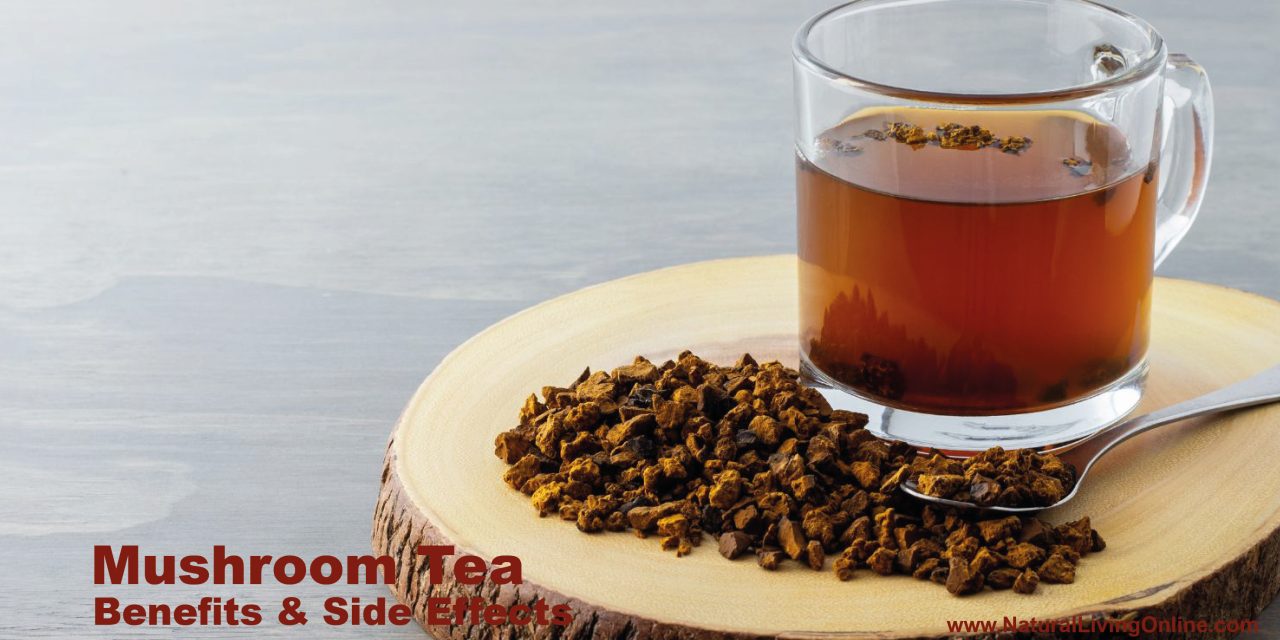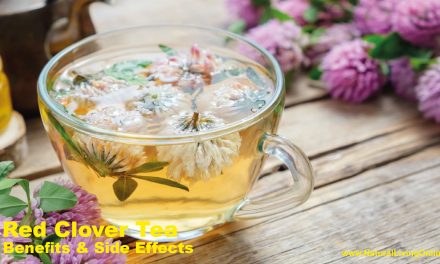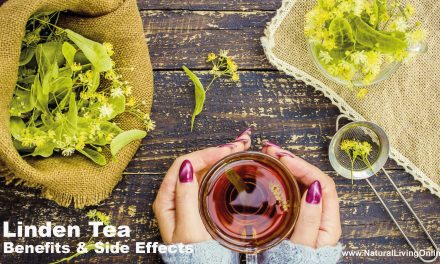Mushroom tea is gaining popularity among health enthusiasts for its potential health benefits and exotic flavors. This tea is made from medicinal mushrooms like reishi, chaga, and lion’s mane, offering various health-boosting properties. Drinking mushroom tea may help reduce stress, improve sleep quality, and support immune function.
The mushrooms used in these teas contain bioactive compounds that can promote brain health and improve gut health. For example, lion’s mane mushrooms have been shown to support cognitive function.
However, while mushroom tea can be beneficial, it is important to be aware of potential side effects. Some individuals might experience allergic reactions or digestive issues. Understanding both the benefits and the potential risks will help you make informed decisions about incorporating mushroom tea into your diet.
Key Takeaways
- Mushroom tea offers potential health benefits, including reducing stress and improving sleep.
- Lion’s mane and reishi mushrooms are particularly noted for their brain and immune health benefits.
- Be aware of possible side effects like allergies or digestive problems when consuming mushroom tea.
The Composition of Mushroom Tea
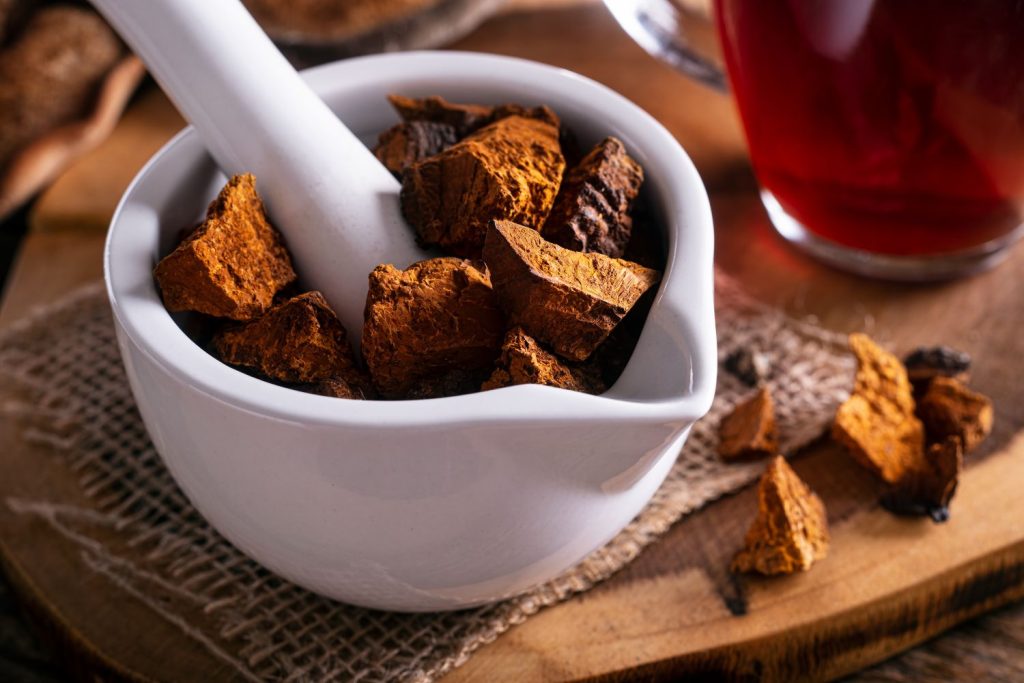
Mushroom tea is crafted from various types of mushrooms, each offering unique health benefits. These mushrooms contain bioactive compounds that contribute to the tea’s nutritional profile.
Types and Sources of Mushrooms
Mushroom tea can be made using a variety of mushrooms including reishi, chaga, lion’s mane, cordyceps, shiitake, maitake, and turkey tail. Each of these fungi has distinct properties:
- Reishi Mushrooms: Known for their immune-boosting properties.
- Chaga: High in antioxidants, promotes overall health.
- Lion’s Mane: Benefits brain health and cognitive function.
- Cordyceps: Enhances energy and athletic performance.
- Shiitake: Supports heart health.
- Maitake: Helps regulate blood pressure.
- Turkey Tail: Contains compounds that boost immune function.
These edible mushrooms are typically dried and powdered for use in teas.
Bioactive Compounds and Nutrition
The nutritional benefits of mushroom tea come from the bioactive compounds found in these mushrooms:
- Antioxidants: Help reduce oxidative stress and inflammation.
- Vitamin D: Some mushrooms, like shiitake, are exposed to sunlight or UV to increase their vitamin D levels.
- Beta-glucan: Found in mushrooms like chaga and turkey tail, this fiber boosts immune function.
- Adaptogens: Found in reishi, cordyceps, and lion’s mane, they help the body manage stress.
These compounds work together to provide a range of health benefits, making mushroom tea a popular choice for those looking to improve their well-being.
Health Advantages of Drinking Mushroom Tea
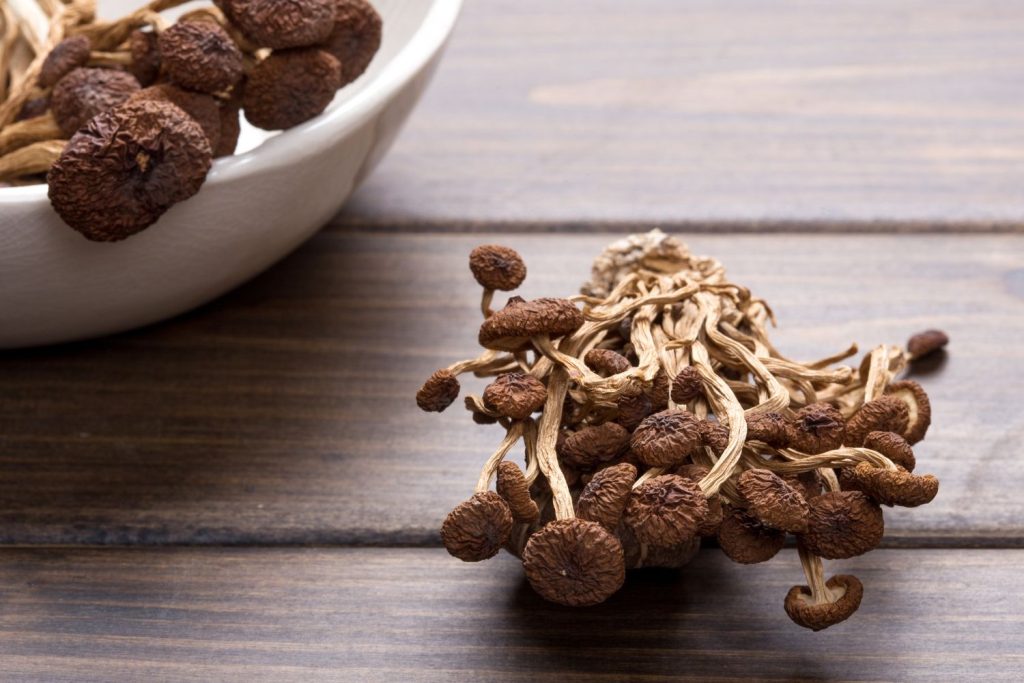
Mushroom tea offers various health benefits due to its rich content of medicinal mushrooms, vitamins, and minerals. It can improve the immune system, support heart health, and enhance cognitive function.
Immune System Enhancement
Mushroom tea is known for its immune-boosting properties. The antioxidants in mushrooms like reishi and chaga help combat oxidative stress and reduce inflammation. These mushrooms act like adaptogens, protecting the body against stress and bolstering immune system defenses.
Regular consumption of mushroom tea may support immune response, making the body more efficient at fighting off illnesses. Its immune-supporting properties are particularly beneficial during cold and flu season, helping reduce the severity and duration of symptoms.
Benefits for Heart and Blood Sugar
Mushroom tea also contributes to better heart health and blood sugar control. Mushrooms like lion’s mane and reishi have been linked to stress management and blood sugar control. They help regulate cholesterol levels, which is crucial for maintaining a healthy heart.
Furthermore, these mushrooms can assist in managing blood sugar levels, reducing the risk of diabetes. Drinking mushroom tea can improve blood flow and reduce the risk of cardiovascular diseases by keeping blood vessels healthy and flexible. Regular intake may also help in controlling blood pressure.
Mental and Cognitive Impact
Improving mental and cognitive health is another significant benefit of mushroom tea. The adaptogenic properties of mushrooms like lion’s mane can enhance focus and mental clarity. They support cognitive function and are believed to protect against neurodegenerative diseases.
Consuming mushroom tea can lead to better brain health, which includes enhanced memory and reduced mental fatigue. These mushrooms help maintain mental health by fighting oxidative stress in the brain and supporting neuron growth. This can be particularly useful for students, professionals, and the elderly looking to keep their minds sharp and healthy.
Mushroom Tea Preparation Techniques
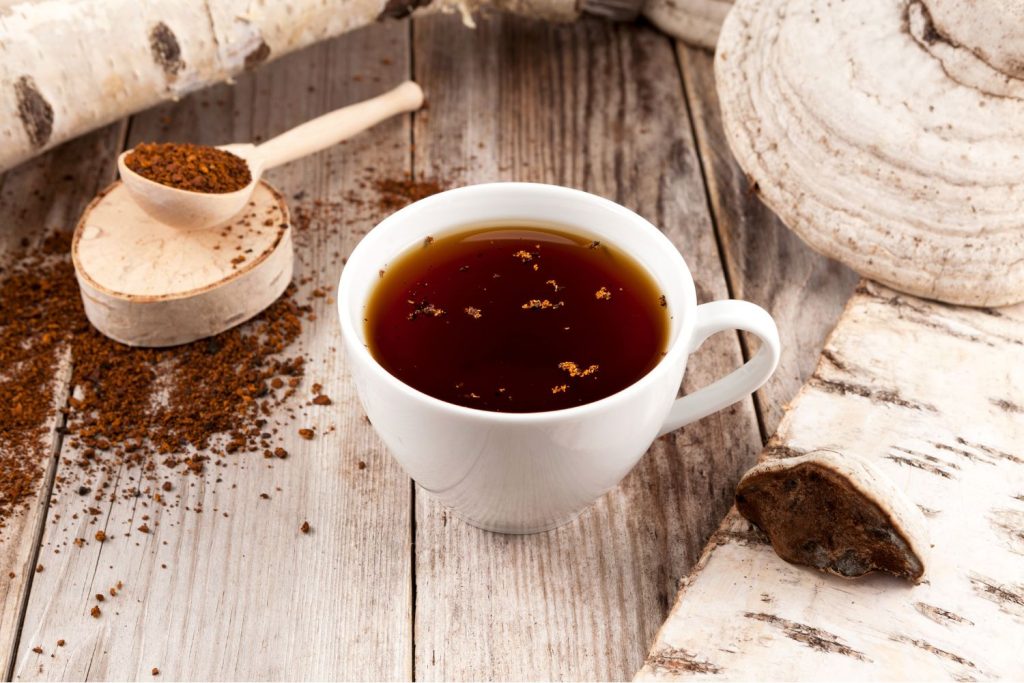
Preparing mushroom tea involves a few key steps to ensure that the beneficial compounds are properly extracted. It’s important to choose the right mushrooms and follow specific brewing methods to get the best results.
Methods of Steeping and Brewing
Hot Water Steeping:
Hot water steeping is a common method for making mushroom tea. Start by bringing water to a boil, then let it cool slightly before pouring it over the mushrooms. Reishi mushroom tea and chaga mushroom tea benefit greatly from this method, as it helps release their powerful compounds. Let the mixture steep for 15-20 minutes.
Simmering Fresh Mushrooms:
For fresh mushrooms, like adaptogenic mushrooms such as lion’s mane or cordyceps, simmering is effective. Chop the mushrooms into small pieces and add them to a pot of hot water. Simmer gently for 30-45 minutes. This method draws out the active ingredients, enhancing the tea’s benefits.
Using a Tea Infuser:
A tea infuser provides an easy and convenient way to prepare mushroom tea. Simply place dried mushrooms in the infuser, and immerse it in hot water. Steep for around 10-15 minutes. It works well with various types of mushrooms, making the preparation process simple while delivering effective results.
Potential Side Effects and Health Risks
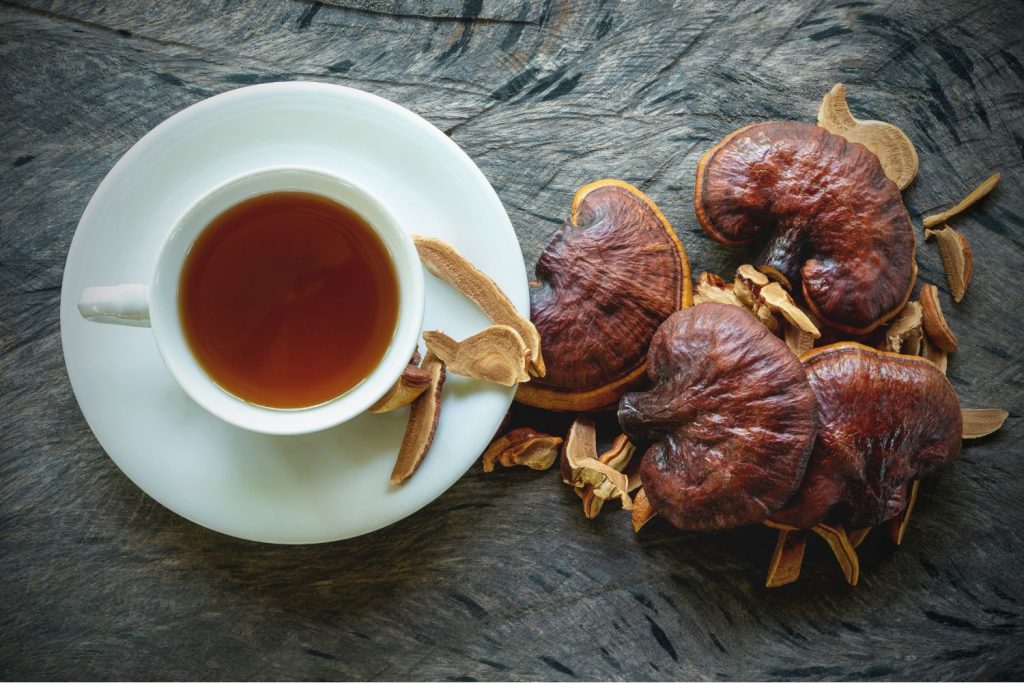
Mushroom tea, while popular for its health benefits, can also cause some side effects and health risks. It’s important to consider both individual reactions and potential interactions with medications or health conditions.
Understanding Common Adverse Reactions
Drinking mushroom tea can lead to some common adverse reactions. Some people may experience digestive discomfort, which can include symptoms like nausea, bloating, or diarrhea. These symptoms are more likely if the tea is consumed in large amounts.
Allergic reactions are another risk. Mushrooms like reishi and chaga can cause skin rashes, itching, and even respiratory issues in people who are allergic. Starting with small amounts and observing the body’s reactions can help minimize these risks.
A few individuals might also find themselves sensitive to the adaptogens in mushrooms. These compounds can sometimes affect the body’s stress response, leading to unexpected reactions.
Interaction with Medications and Health Conditions
Mushroom tea might interact with certain medications and health conditions. For instance, compounds in reishi and chaga can affect blood sugar levels, which could be problematic for people on diabetes medication. This interaction could lead to dangerously low blood sugar levels if not monitored closely.
Those taking blood thinners should also be cautious. Reishi has been known to affect blood clotting and could enhance the effects of these medications, leading to increased bleeding risk.
People with autoimmune diseases should consult a healthcare provider before consuming mushroom tea. Some mushrooms can stimulate the immune system, potentially exacerbating autoimmune conditions. It is always advisable to discuss with a healthcare provider before adding new supplements to one’s diet.
Mushroom Tea in Holistic and Traditional Practices
Mushroom tea has a history in both holistic and traditional practices. In Eastern medicine, certain mushrooms hold significant medicinal properties.
Reishi (also known as Ganoderma lucidum) is renowned for its potential to boost the immune system and fight stress. It has been used for centuries in China and Japan.
Lion’s mane (or Hericium erinaceus) is valued for its cognitive benefits. Practitioners believe it may help improve memory and mental clarity.
In holistic practices, these mushrooms are often combined into teas to create a balanced approach to wellness. They are touted for their ability to promote homeostasis, maintaining a stable internal environment in the body.
Common Mushroom Tea Health Benefits
| Mushroom Type | Health Benefit |
|---|---|
| Reishi | Stress reduction, immunity |
| Lion’s Mane | Cognitive support, memory |
| Maitake | Blood sugar control |
| Chaga | Antioxidant properties |
Many people include mushroom tea in their daily routines for these potential benefits. While the medicinal properties of these fungi are still being studied, traditional practices continue to value them highly.
Frequently Asked Questions
What are the recognized health benefits of consuming mushroom tea?
Mushroom tea is known for its potential health benefits, including immune system support and stress management. Varieties like Chaga, reishi, and lion’s mane may help with blood sugar control and mental clarity, offering a natural way to improve overall health.
While reishi mushroom tea is often praised for its health benefits, some studies have raised concerns about liver-related side effects. Symptoms may include liver toxicity and enzyme changes, indicating that individuals with liver conditions should be cautious.
Can chaga mushroom tea consumption improve health, and if so, how?
Chaga mushroom tea is believed to enhance health by supporting immune function and fighting inflammation. Its antioxidants help protect cells from damage, making it a beneficial addition to a balanced diet.
Who are advised to avoid the consumption of mushroom tea?
People with allergies to mushrooms, pregnant or breastfeeding women, and those with certain medical conditions should avoid consuming mushroom tea. Consulting a healthcare provider before starting any new supplement is recommended to ensure safety.
What are the common side effects associated with mushroom supplements?
Common side effects of mushroom supplements include digestive issues, such as nausea or stomach upset. Some individuals may also experience allergic reactions, including rashes or itching. You need to monitor your body’s reaction when trying new supplements.
Does regular consumption of mushroom tea support liver health?
Some mushrooms are rich in antioxidants, but there is limited evidence to suggest that regular consumption of mushroom tea directly supports liver health. The effects on liver health are still unclear. It’s best to consult medical professionals for personalized advice.
References:
A review of the effects of mushrooms on mood and neurocognitive health across the lifespan
Therapeutic Properties of Edible Mushrooms and Herbal Teas in Gut Microbiota Modulation
This website does not provide medical advice.
All information provided on this website, and on associated social media networks, including but not limited to texts, images, and numbers are for general information purpose only. It is not intended as medical advice and it does not include all possible precautions, side effects, or interactions that may occur. Neither NaturalLivingOnline.com nor its author/founder take responsibility for how you use this information. Statements contained on NaturalLivingOnline.com have not been evaluated by the FDA. You should conduct thorough research via multiple sources and consult your physician or qualified doctor before using any essential oil or herbal remedy. Information on NaturalLivingOnline.com must not be relied upon for medical, legal, financial or other decisions.

